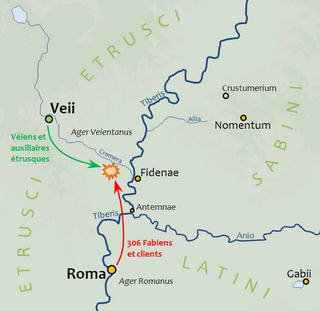Related Research Articles

Year 216 BC was a year of the pre-Julian Roman calendar. At the time it was known as the Year of the Consulship of Varro and Paullus. The denomination 216 BC for this year has been used since the early medieval period, when the Anno Domini calendar era became the prevalent method in Europe for naming years.
Agrarian laws were laws among the Romans regulating the division of the public lands, or ager publicus. In its broader definition, it can also refer to the agricultural laws relating to peasants and husbandmen, or to the general farming class of people of any society.

Publius Valerius Poplicola or Publicola was one of four Roman aristocrats who led the overthrow of the monarchy, and became a Roman consul, the colleague of Lucius Junius Brutus in 509 BC, traditionally considered the first year of the Roman Republic.

The Battle of Numistro was fought in 210 BC between Hannibal's army and one of the Roman consular armies led by consul Marcus Claudius Marcellus. It was the fourth time they met in a battle. Previous encounters were located around the walls of Nola (Campania) in 216, 215, and 214 and had been favourable for the Roman side.

The Battle of the Cremera was fought between the Roman Republic and the Etruscan city of Veii, in 477 BC.
The Roman–Etruscan Wars were a series of wars fought between ancient Rome and the Etruscans. Information about many of the wars is limited, particularly those in the early parts of Rome's history, and in large part is known from ancient texts alone. The conquest of Etruria was completed in 265–264 BC.
Gnaeus Manlius Cincinnatus was the first of the patrician gens Manlia to obtain the consulship, which he held in 480 BC, together with Marcus Fabius Vibulanus. His father's name was Publius.
The gens Verginia or Virginia was a prominent family at ancient Rome, which from an early period was divided into patrician and plebeian branches. The gens was of great antiquity, and frequently filled the highest honors of the state during the early years of the Republic. The first of the family who obtained the consulship was Opiter Verginius Tricostus in 502 BC, the seventh year of the Republic. The plebeian members of the family were also numbered amongst the early tribunes of the people.
Caeso Fabius Vibulanus was consul of the Roman republic in 484, 481, and 479 BC. He had earlier held the office of quaestor parricidii in 485 BC in connection with the trial and execution of Spurius Cassius Vecellinus.
This section of the timeline of Hispania concerns Spanish and Portuguese history events from the Carthaginian conquests to before the barbarian invasions.
The Roman–Sabine wars were a series of wars during the early expansion of ancient Rome in central Italy against their northern neighbours, the Sabines. It is commonly accepted that the events pre-dating the Roman Republic in 509 BC are semi-legendary in nature.
The Roman-Aequian wars were a series of wars during the early expansion of ancient Rome in central Italy against their eastern neighbours, the Aequi.
Marcus Fabius Vibulanus was consul of the Roman republic in 483 and 480 BC.
Titus Menenius Lanatus was a Roman patrician of the fifth century BC. He was elected consul for the year 477. He unsuccessfully fought the Veiientes, and was later prosecuted by the tribunes of the plebs for his failure to prevent the disaster of the Cremera.
Vopiscus Julius Iullus was a Roman statesman, who held the consulship in 473 BC, a year in which the authority of the Roman magistrates was threatened after the murder of a tribune of the plebs.
Gaius Julius Iullus was consul in 447 BC, and again in 435.
Titus Verginius Tricostus Rutilus, was consul of the Roman Republic in 479 BC. He held the office with Caeso Fabius Vibulanus.
Aulus Verginius Tricostus Rutilus was a Roman consul in 476 BC.
Publius Valerius Poplicola was consul of the Roman Republic in 475 BC and 460 BC, and interrex in 462 BC.
Lucius Lucretius Tricipitinus was a Roman senator in the fifth century BC, and was consul with Titus Veturius Geminus Cicurinus in 462 BC.
References
- 1 2 Titus Livius, Ab Urbe Condita , ii. 51.
- ↑ Titus Livius, Ab Urbe Condita , ii. 50–51.
- ↑ Titus Livius, Ab Urbe Condita , ii. 52.
- ↑ Dionysius of Halicarnassus. ix. 35.4
- ↑ Broughton, vol i. pp.28